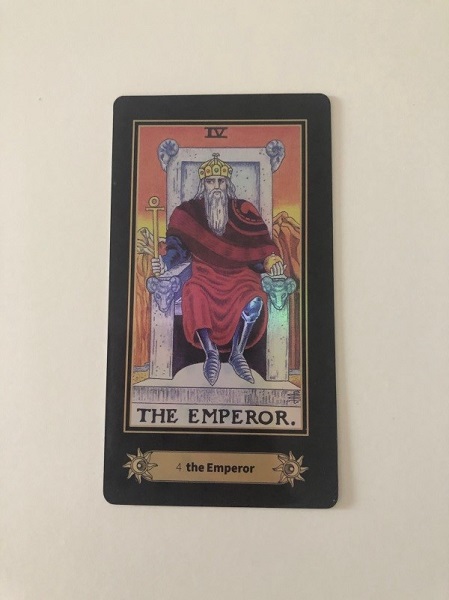The Emperor card, the fourth of the Major Arcana in a Tarot deck, symbolizes authority, structure, control, and fatherly guidance. It stands as a formidable figure, often depicted sitting on a throne adorned with symbols of power, suggesting a deep-rooted connection to the archetypal roles of leadership and dominance. The card reflects not just the power, but the responsibility that accompanies it, a duality that intrigues those who seek to understand its meaning within the complex tapestry of life experiences.
At a glance, the Emperor is a personification of authority figures: kings, fathers, or leaders. He embodies the qualities of decisiveness and order, bringing to mind the imperatives of discipline and strategic planning. But beneath this ostensibly stoic facade lies a confluence of deeper meanings that beckon one to explore the nuances of personal power and the latent fears that often accompany responsibility. This card serves as a mirror, reflecting our aspirations and apprehensions related to governance, both over ourselves and in our broader engagement with society.
When the Emperor card appears in a reading, it often signifies the need to establish stability in one’s life. This delineation between chaos and order is essential; without a solid foundation, endeavors may succumb to disarray. It beckons individuals to step into their power, asserting control over their circumstances. However, this power is not just about taking charge; it is intertwined with the wisdom of strategic thinking and the ethical use of authority. It challenges the querent to examine what power means to them and how it manifests in their lives.
Moreover, the Emperor evokes conversations about legacy. One must consider how one wishes to be remembered and what impact they want to leave on others. This card resonates with the notion of generational influence and mentorship, raising questions about how our decisions echo through the lives of those we lead or care for. The Emperor’s concern for establishing order extends beyond the individual, prompting a reflection on the societal structures we inhabit and contribute to. In this sense, it serves as a reminder of collective responsibility and the broader implications of leadership.
Transformational authority is another poignant aspect underscored by the Emperor. While he represents stability and structure, he also embodies the necessity for adaptability within parameters. True leadership is not static; it demands a willingness to evaluate and adjust strategies as circumstances evolve. Thus, the card also touches on the intricacies of managing power—how to wield it effectively while remaining accountable for its consequences.
Additionally, the Emperor can evoke themes of paternal relationships, where the archetype resonates with the nurturing yet directive qualities of a father figure. This connection raises discussions around the attributes that define healthy authority versus tyrannical control. For some, this may represent a call to confront unresolved familial dynamics that shape their understanding and acceptance of leadership roles in their personal lives. The balance between guidance and overreach becomes a central theme, illustrating the delicate interplay between strength and compassion.
Yet, the card’s traditional symbolism, including the throne, armor, and the scepter, delves into the protection inherent in authority. The Emperor often signifies the need to defend the structures we build, whether they are relationships, careers, or communities. Protection implies vulnerability—an acknowledgment that despite the facade of strength, there exist fears that often govern our decisions. This duality—the fierce protector and the tender overseer—adds layers to the interpretation of power in the context of leadership.
The appearance of the Emperor in a Tarot reading may also prompt one to consider external influences. Perhaps you find yourself seeking guidance from mentors or authority figures, which speaks to the communal aspect of power. The wisdom of others often helps navigate the complexities presented by challenges, thus reinforcing the idea that leadership is rarely a solitary endeavor. It thrives within a network of relationships and collaborations, highlighting that collaboration often enhances the efficacy of individual authority.
Moreover, the juxtaposition of rigidity and flexibility denotes the card’s deeper implications for personal growth. Contemplating structures in life encourages one to reflect on the frameworks that either support or hinder progress. Are there outdated beliefs or practices that need re-evaluation? The Emperor urges introspection and accountability, encouraging one to dismantle barriers that obstruct growth while embracing the principles that foster resilience.
Psychologically, the Emperor may also appear during periods of transition, serving as a reminder of the balance between inner strength and discipline. The urge to establish control manifests as a response to uncertainty. In turbulent times, such clarity can be instrumental in navigating the stormy seas of life. This aspect of the Emperor encourages individuals to cultivate their intrinsic authority, endorsing a self-reliant path forward when external conditions may seem tumultuous.
In conclusion, the Emperor card encompasses a rich fabric of meanings, reaching far beyond the surface-level interpretation of authority and control. Its examination incites an exploration of personal power, legacy, and the responsibilities inherent in leadership. It invites a dialogue about familial influence, protection, and the balance between compassionate guidance and authoritative decisiveness. As one delves into the depths of this formidable Tarot card, they uncover the intricacies of human experience that lie at the intersection of power, responsibility, and resilience.







Leave a Comment